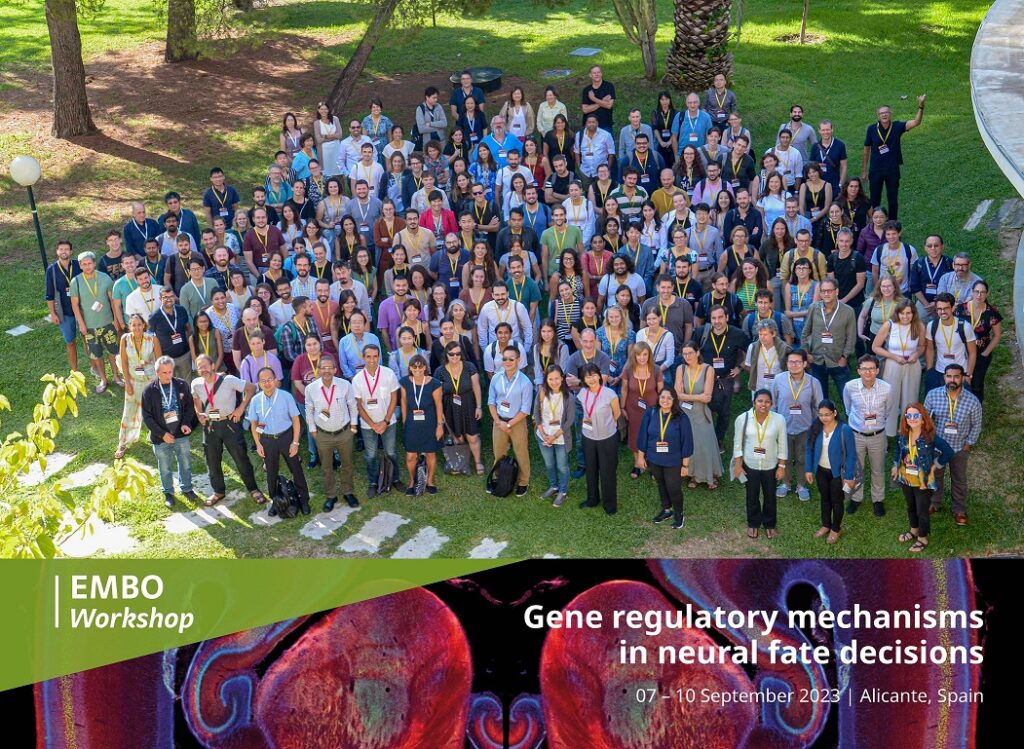EMBO Workshop “Gene regulatory mechanisms in neural fate decisions”
18 de September de 2023
More than 200 scientists dedicated to neuroscience have met in Sant Joan d'Alacant to celebrate the workshop ‘Gene regulatory mechanisms in neural fate decisions' of the European Molecular Biology Organization (EMBO). The conference, which took place from September 7 to September 10 at the Complejo San Juan in Alicante, has been a meeting point between young researchers and world leaders in neuroscience and biomedicine.
In recent years, new technologies have provided new dimensions in understanding the fate decision of neural stem cells in brain evolution, development, and function. Through several sessions of talks, posters, and informal meetings, attendees were able to enjoy a forum to discuss the latest findings in deciphering the molecular mechanisms underlying neural stem cell fate choices, their intertwined epigenetics and transcriptional molecular logic, and approaches to restore their function when these mechanisms fail in certain disorders.
The meeting has been organized by researchers Víctor Borrell (principal investigator of Neurogenesis and Cortical expansion group at the Institute for Neuroscience CSIC-UMH), Vijay Tiwari (Queen’s University, UK), Federico Calegari (Center for Regenerative Therapies Dresden, Germany), Magdalena Götz (Helmholtz Zentrum München & Biomedical Center, Ludwig Maximilian University of Munich, Germany), Christopher A. Walsh (Boston Children’s Hospital & Harvard Medical School, USA) and Yukiko Gotoh (University of Tokyo, Japan).
More than 40 speakers, world leaders in their field
The first session was about the interplay of epigenetic modifications. In that session, prominent speakers participated such as Dirk Schübeler, who directs the Friedrich Miescher Institute for Biomedical Research (Basel, Switzerland); John Rubenstein, whose laboratory at the University of California San Francisco (USA) has demonstrated the role of specific genes in regulating the specification, differentiation, migration, and growth of neuronal axons during embryonic development and adult life; or Sebastian Jessberger, who directs the Brain Research Institute at the University of Zurich (Switzerland).
The second session, dedicated to genetic regulation mechanisms, included, among others, presentations by Alerie Guzmán de la Fuente, a researcher of the Molecular control of neuronal axon myelination group, led by Hugo Cabedo at the Institute for Neuroscience CSIC-UMH; Nancy Papalopulu, from the University of Manchester (UK), on the mechanisms of molecular oscillations and their role in stem cell fate; Magdalena Götz, on the regulation of mitochondria on neurogenesis; Ana Pombo, who investigates the interactions between the organization of the genome, its regulation and function, at the Max Delbrück Center in Berlin (Germany); and Víctor Borrell, whose research at the Institute for Neurosciences focuses on understanding the cellular and molecular mechanisms that control the expansion of the cerebral cortex observed across mammalian evolution.
The third session consisted of new approaches to deciphering the mechanisms of neural fate decisions. Noteworthy are the interventions of Eileen Furlong, head of the Genome Biology Unit at the European Molecular Biology Laboratory (EMBL), who focused on the properties of enhancer function during embryonic development; and Sergiu Pasca (Stanford University, California, USA), who presented his latest discoveries on the use of brain organoids as a model of diseases of human brain development.
Finally, the fourth session focused on the implication that neuronal fate decisions have on brain function and diseases. The presentation by Angel Barco, director of the Institute for Neurosciences and the laboratory Transcriptional and epigenetic mechanisms of neuronal plasticity, which investigates the role that certain epigenetic and transcription factors play in the processes that allow learning, the formation of new memories and in other modifications of animal behavior, and how the malfunction of these mechanisms can lead to pathologies of the nervous system. Also taking part was Li-Huei Tsai, who investigates the pathogenic mechanisms behind neurological disorders that affect learning and memory in her laboratory at the Picower Institute for Learning and Memory at MIT (USA); and Michael Greenberg (Harvard Medical School, Massachusetts, USA) who, among his numerous recognitions, has the 2023 Brain Prize for discovering how the synthesis of new proteins is triggered in different parts of the neuron.
More information on the attached document (PDF file).
Website: https://meetings.embo.org/event/23-neural-fate
Source: Institute for Neuroscience UMH-CSIC (in.comunicacion@umh.es)


 Español
Español